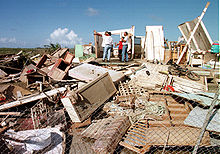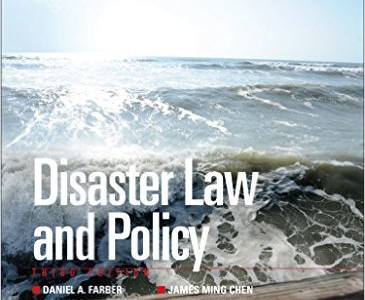Hurricane Sandy
Rebuilding: Lessons from Katrina and Sandy
Recent experience shows that rebuilding is a slow, frustrating process.
We’ve had experience with the rebuilding process twice in the past dozen years, after Hurricanes Katrina and Sandy. The storm destruction takes place in a matter of days, but rebuilding takes years — just like the difference between the instant it takes to break a leg and the subsequent weeks of wearing a cast. Houston …
Continue reading “Rebuilding: Lessons from Katrina and Sandy”
CONTINUE READINGDisaster Law and Policy
A new textbook on the emerging field of Disaster Law.
I’m delighted to announce the publication of the third edition of Disaster Law and Policy. Although I might not normally use this blog to promote a new book, I’d like to think in this case this is more than just shameless self-promotion. That’s for two reasons: the lion’s share of the credit for the improvements …
Continue reading “Disaster Law and Policy”
CONTINUE READINGSuperfund and climate change
Over the last several years, it’s become fashionable in some circles to suggest that environmental law today reduces to climate change law. I’ve resisted that framing because I think it’s important to remember that “conventional” environmental problems still exist, still matter, and must be addressed by strategies beyond climate mitigation or adaptation. But the fact …
Continue reading “Superfund and climate change”
CONTINUE READINGRewarding Climate Adaptation Heroes
Earlier this week, Mother Jones posted a piece on how the public rewards politicians for disaster response instead of disaster prevention: Politicians get much more credit for their reaction to disasters like Sandy than they do for trying to ensure disasters don’t cause so much damage in the first place. The post cites a 2009 …
Continue reading “Rewarding Climate Adaptation Heroes”
CONTINUE READING“United We Stand”: National Unity in the Face of Disaster
During the Republican primaries, Governor Romney proposed curtailing or even eliminating the federal role in disaster response, leaving the response efforts to the states or the private sector. Why does this seem viscerally wrong to so many people today (enough so that Romney first refused to answer any questions about it and then abandoned it …
Continue reading ““United We Stand”: National Unity in the Face of Disaster”
CONTINUE READINGWhatever Happened to Environmental Politics?
Mayor Bloomberg’s endorsement of President Obama on climate-change grounds is depressing because it is so surprising. It tells us something quite bleak that 1) someone had to make clear the relevance of climate to Hurricane Sandy; and 2) someone doing so came as a shock to people. Indeed, through the campaign, climate has been essentially …
Continue reading “Whatever Happened to Environmental Politics?”
CONTINUE READINGRedeeming FEMA: How the Agency has Been Strengthened Since Katrina
Today’s FEMA is a lot different from the organization that flubbed the Katrina response. There have been a number of positive changes, mostly during the past four years. First, as the Washington Post explains, FEMA’s authority has expanded: Congress has broadened FEMA’s authority so that the agency can respond in advance of major storms, instead …
Continue reading “Redeeming FEMA: How the Agency has Been Strengthened Since Katrina”
CONTINUE READINGA Resource on Disaster Law Issues
As the storm slowly passes through, there will inevitably be questions about a host of issues: the scope of FEMA’s role, the requirements of the Stafford Act, the operation of flood insurance, how private insurance might or might not apply, and so forth. The Berkeley Law School Library has established a great website with copies …
Continue reading “A Resource on Disaster Law Issues”
CONTINUE READINGRomney Versus Disaster Assistance
In assessing Romney’s argument that disaster response should be a state or private responsibility, we should consider his record in Massachusetts. In his last year as governor, Romney refused to provide state assistance when major floods hit western Massachusetts., even though the state government had ample funds. Romney had already begun to run for President, …
Continue reading “Romney Versus Disaster Assistance”
CONTINUE READING





